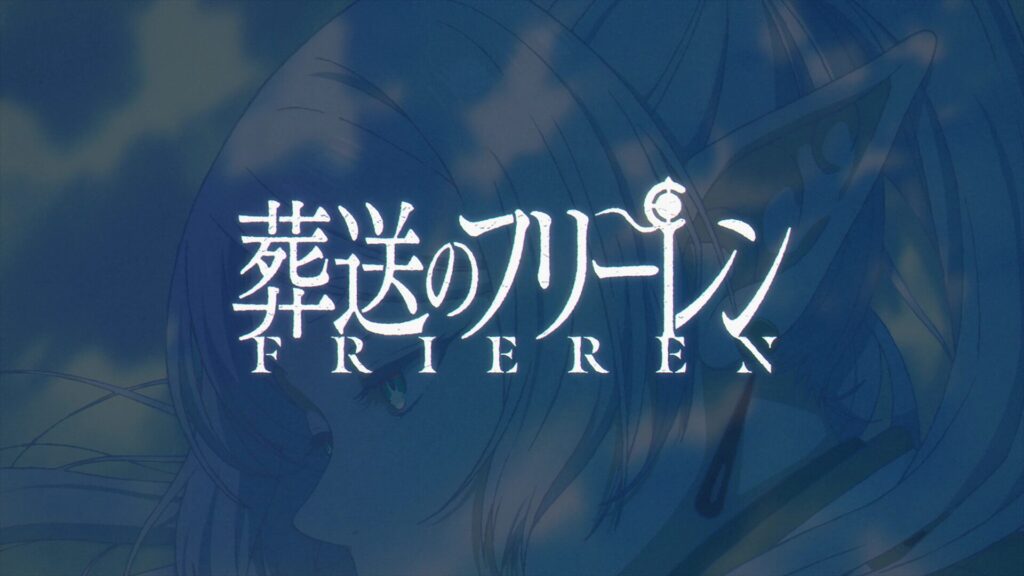
🟦 Learning to Say Goodbye for the First Time
Magic training has begun.
まほうの くんれんが はじまりました。
魔法の訓練が始まりました。
Frieren decides to raise Fern as her apprentice.
ふりーれんは ふぇるんを でしとして そだてることに しました。
フリーレンはフェルンを弟子として育てることにしました。
Before setting out, they share a final moment with Heiter.
たびだつ まえに、 ふたりは はいたーと さいごの じかんを すごしました。
旅立つ前に、二人はハイターと最後の時間を過ごしました。
Frieren begins to learn what it means to part ways.
ふりーれんは わかれの いみを すこしずつ まなびはじめました。
フリーレンは別れの意味を少しずつ学び始めました。
Together, they take their first step on a new journey.
ふたりは いっしょに あたらしい ぼうけんへ あるきだしました。
二人は一緒に新しい冒険へ歩き出しました。
🌟 Scene Vocabulary
● くんれん(訓練) /kun.ren/ – Noun
Meaning: Training; practice
● でし(弟子) /de.shi/ – Noun
Meaning: Apprentice; disciple
● そだてる(育てる) /so.da.te.ru/ – Verb
Meaning: To raise; to train
● さいご(最後) /sa.i.go/ – Noun
Meaning: Final; last
● わかれる(別れる) /wa.ka.re.ru/ – Verb
Meaning: To part; to say goodbye
● あるきだす(歩き出す) /a.ru.ki.da.su/ – Verb
Meaning: To start walking; to set out
Quote #1 – Not Something You Can Fix Overnight
さっきは 途中(とちゅう)で 魔法(まほう)が 離散(りさん)してしまったね。 魔力(まりょく)の 量(りょう)と、 打(う)ち出(だ)す 力(ちから)が 足(た)りないことを 示(しめ)している。 それは 一朝一夕(いっちょういっせき)で どうにかなることじゃない。
Earlier, your magic dissipated before it reached its target. That tells me your levels of mana and your firing strength are both lacking. These are not issues that one can fix overnight.
さっきは とちゅうで まほうが りさん して しまったね。
まりょくの りょうと、 うちだす ちからが たりないことを しめしている。
それは いっちょういっせきで どうにか なること じゃない。
sakki wa tochuu de mahou ga risan shite shimatta ne.
maryoku no ryou to, uchidasu chikara ga tarinai koto o shimeshite iru.
sore wa icchou isseki de dounika naru koto ja nai.
🌟 Waku Waku Word Dive
● りさん(離散) /ri.san/ – Verb/Noun
Meaning: Dissipation; scattering
● まりょく(魔力) /ma.ryo.ku/ – Noun
Meaning: Magical power; mana
● うちだす(打ち出す) /u.chi.da.su/ – Verb
Meaning: To fire off; to launch
● たりない(足りない) /ta.ri.na.i/ – Adjective
Meaning: Lacking; not enough
● いっちょういっせき(一朝一夕) /ic.chou.is.se.ki/ – Idiom
Meaning: Overnight; in a short time
● しめす(示す) /shi.me.su/ – Verb
Meaning: To indicate; to show
📘 Mini Grammar Boost
~してしまった
Ex: 魔法(まほう)が 離散(りさん)してしまった
Tip: Indicates something happened unintentionally or regrettably — “ended up doing”
~ことを示している
Ex: 足(た)りないことを 示(しめ)している
Tip: Means “this shows that…” — often used in explanations or deductions
~じゃない
Ex: 一朝一夕(いっちょういっせき)で どうにかなることじゃない
Tip: Used to deny an expectation or hope — “It’s not something you can fix easily.”
一朝一夕で
Ex: 一朝一夕(いっちょういっせき)で
Tip: Idiom meaning “in a single day” — implies that something takes time and effort
🔀 Slash Reading – Japanese / English
さっきは 途中(とちゅう)で 魔法(まほう)が 離散(りさん)してしまったね。
Earlier, your magic dissipated before reaching its target.
魔力(まりょく)の 量(りょう)と、 打(う)ち出(だ)す 力(ちから)が 足(た)りないことを 示(しめ)している。
That shows your mana amount and firing strength are lacking.
それは 一朝一夕(いっちょういっせき)で どうにか なること じゃない。
That’s not something one can fix overnight.
Quote #2 – “Eventually” Won’t Be Soon Enough
それは いずれ 必(かなら)ず できることだ。 今(いま)は。 いずれでは ダメなのです。 いずれでは、 ハイター様(さま)が 死(し)んでしまう。
I have no doubt you’ll achieve it eventually. Right now. It cannot be “eventually.” When “eventually” comes… Master Heiter will have passed away.
それは いずれ かならず できること だ。
いまは。
いずれでは だめ なのです。
いずれでは、 はいたーさまが しんで しまう。
sore wa izure kanarazu dekiru koto da.
ima wa.
izure de wa dame na no desu.
izure de wa, Haitā-sama ga shinde shimau.
🌟 Waku Waku Word Dive
● いずれ /i.zu.re/ – Adverb
Meaning: Eventually; someday
● かならず(必ず) /ka.na.ra.zu/ – Adverb
Meaning: Without fail; certainly
● しぬ(死ぬ) /shi.nu/ – Verb
Meaning: To die
● しまう(~てしまう) /shi.ma.u/ – Aux verb
Meaning: To end up doing (often with regret or finality)
● だめ /da.me/ – Adjective/Noun
Meaning: Not allowed; no good
● なのです /na.no.de.su/ – Phrase
Meaning: Polite explanatory tone (soft emphasis)
📘 Mini Grammar Boost
~いずれ 必ず [verb]
Ex: いずれ 必(かなら)ず できる
Tip: “Eventually you’ll surely…” – used to express strong belief in future success
~では ダメ
Ex: いずれでは ダメ
Tip: “It can’t be [X]” – used to reject or negate a condition
~てしまう
Ex: 死(し)んでしまう
Tip: Expresses regret or finality — “will end up dying”
~なのです
Ex: ダメ なのです
Tip: Polite form of explanation — “because it’s not acceptable”
🔀 Slash Reading – Japanese / English
それは いずれ 必(かなら)ず できること だ。
You’ll definitely be able to do it — eventually.
今(いま)は。
But right now…
いずれでは ダメ なのです。
“Eventually” won’t be good enough.
いずれでは、 ハイター様(さま)が 死(し)んで しまう。
Because by then, Master Heiter will have passed away.
Quote #3 – Memories Worth Living For
私(わたし)が このまま 死(し)んだら、 彼(かれ)から 学(まな)んだ 勇気(ゆうき)や 意思(いし)や 友情(ゆうじょう)や、 大切(たいせつ)な 思(おも)い出(で)まで この世(よ)から なくなってしまうのでは ないかと。 あなたの 中(なか)にも 大切(たいせつ)な 思(おも)い出(で)が あるとすれば、 死(し)ぬのは もったいないと 思(おも)います。
If I sat and died in silence, all I learned about friendship, strength of will, and courage… all the precious memories we had made, they would vanish like they had never been. If there is even one precious memory tucked within the walls of your mind, then I think it would be a waste for you to die.
わたしが このまま しんだら、
かれから まなんだ ゆうきや いしや ゆうじょうや、
たいせつな おもいでまで このよから なくなって しまうのでは ないかと。
あなたの なかにも たいせつな おもいでが あるとすれば、
しぬのは もったいないと おもいます。
watashi ga kono mama shindara,
kare kara mananda yuuki ya ishi ya yuujou ya,
taisetsu na omoide made kono yo kara nakunatte shimau no de wa nai ka to.
anata no naka ni mo taisetsu na omoide ga aru to sureba,
shinu no wa mottainai to omoimasu.
🌟 Waku Waku Word Dive
● ゆうき(勇気) /yuu.ki/ – Noun
Meaning: Courage; bravery
● ゆうじょう(友情) /yuu.jou/ – Noun
Meaning: Friendship
● おもいで(思い出) /o.mo.i.de/ – Noun
Meaning: Memory; recollection
● なくなる(無くなる) /na.ku.na.ru/ – Verb
Meaning: To disappear; to be lost
● もったいない /mot.tai.na.i/ – Adjective
Meaning: Wasteful; a shame
● まなぶ(学ぶ) /ma.na.bu/ – Verb
Meaning: To learn; to study
📘 Mini Grammar Boost
~のではないかと
Ex: なくなってしまうのでは ないかと
Tip: A soft way of expressing concern or fear — “I worry that it might…”
~とすれば
Ex: 思(おも)い出(で)が あるとすれば
Tip: “If it’s true that…” — often used for reflection or condition
~のはもったいない
Ex: 死(し)ぬのは もったいない
Tip: Expresses that something is “too precious to lose” — “it would be a waste”
~まで
Ex: 思(おも)い出(で)まで
Tip: Indicates even that (unexpected) thing would be affected — “even memories…”
🔀 Slash Reading ? Japanese / English
私(わたし)が このまま 死(し)んだら、
If I were to die just like this,
彼(かれ)から 学(まな)んだ 勇気(ゆうき)や 意思(いし)や 友情(ゆうじょう)や、
all I learned from him — courage, will, friendship…
大切(たいせつ)な 思(おも)い出(で)まで この世(よ)から なくなって しまうのでは ないかと。
even those precious memories might vanish from this world.
あなたの 中(なか)にも 大切(たいせつ)な 思(おも)い出(で)が あるとすれば、
If you also carry precious memories in your heart,
死(し)ぬのは もったいないと 思(おも)います。
then I think it would be a waste for you to die.
Quote #4 – I’ll Be All Right
魔法使(まほうつか)いでも なんでも いい。 今(いま)は 一人(ひとり)で 生(い)きていく 術(すべ)を 身(み)につけることが 私(わたし)の 恩返(おんがえ)し なのです。 救(すく)って よかったと、 もう 大丈夫(だいじょうぶ)だと、 そう 思(おも)って ほしいのです。
I don’t care if it’s as a mage or whatever else. Learning some kind of skill to support myself is my way of repaying him. He’s the reason I’m here, and I need him to know I’ll be all right when he’s gone.
まほうつかいでも なんでも いい。
いまは ひとりで いきていく すべを みにつけることが わたしの おんがえし なのです。
すくって よかったと、 もう だいじょうぶだと、 そう おもって ほしいのです。
mahou tsukai demo nandemo ii.
ima wa hitori de ikite iku sube o mi ni tsukeru koto ga watashi no ongaeshi na no desu.
sukutte yokatta to, mou daijoubu da to, sou omotte hoshii no desu.
🌟 Waku Waku Word Dive
● なんでも /nan.de.mo/ – Phrase
Meaning: Anything; whatever it is
● すべ(術) /su.be/ – Noun
Meaning: Means; way; method
● みにつける(身につける) /mi.ni.tsu.ke.ru/ – Verb
Meaning: To learn; to acquire (a skill)
● おんがえし(恩返し) /on.gae.shi/ – Noun
Meaning: Repayment of kindness
● すくう(救う) /su.ku.u/ – Verb
Meaning: To save; to rescue
● だいじょうぶ(大丈夫) /da.i.jou.bu/ – Adjective
Meaning: All right; safe
📘 Mini Grammar Boost
~でもなんでもいい
Ex: 魔法使(まほうつか)いでも なんでも いい
Tip: “Whatever it is, it doesn’t matter” — used to express flexibility or resolve
~術を身につける
Ex: 生(い)きていく 術(すべ)を 身(み)につける
Tip: A natural way to say “to learn how to survive” or “to gain life skills”
~のが恩返しです
Ex: 私(わたし)の 恩返(おんがえ)し なのです
Tip: Means “this is how I’ll repay someone’s kindness”
~と思ってほしい
Ex: そう 思(おも)って ほしいのです
Tip: Used to express a wish for someone to believe or feel a certain way
🔀 Slash Reading ? Japanese / English
魔法使(まほうつか)いでも なんでも いい。
I don’t care if it’s as a mage or something else.
今(いま)は 一人(ひとり)で 生(い)きていく 術(すべ)を 身(み)につけることが、 私(わたし)の 恩返(おんがえ)し なのです。
Right now, learning how to live on my own — that’s my way of repaying him.
救(すく)って よかったと、 もう 大丈夫(だいじょうぶ)だと、 そう 思(おも)って ほしいのです。
I want him to think, “I’m glad I saved her — she’ll be okay now.”
Quote #5 – A Proper Mage, After All
フェルンは どうなりましたか? まだ 荒(あら)い ところは あるけど、 一人前(いちにんまえ)と いっても 遜色(そんしょく)の ない レベルだよ。 そうですか、 間(ま)に合(あ)いましたか。 もう 足手(あしで)まといでは ありませんね、 フリーレン。
How’s Fern? Is she growing strong? She has room to improve in some areas. But it wouldn’t be incorrect to call her a proper mage. Excellent. So, she made it in time. It’ll be hard for you to say she’ll get in your way, now won’t it?
ふぇるんは どうなりましたか?
まだ あらい ところは あるけど、
いちにんまえ と いっても そんしょくの ない れべる だよ。
そうですか、 まにあいましたか。
もう あしでまとい では ありませんね、 ふりーれん。
Ferun wa dou narimashita ka?
mada arai tokoro wa aru kedo,
ichininmae to itte mo sonshoku no nai reberu da yo.
sou desu ka, maniaimashita ka.
mou ashidematoi de wa arimasen ne, Furīren.
🌟 Waku Waku Word Dive
● あらい(荒い) /a.ra.i/ – Adjective
Meaning: Rough; unrefined
● いちにんまえ(一人前) /i.chi.nin.ma.e/ – Noun
Meaning: Fully qualified person; professional
● そんしょく(遜色) /son.sho.ku/ – Noun
Meaning: Inferiority; shortcoming
● まにあう(間に合う) /ma.ni.a.u/ – Verb
Meaning: To make it in time
● あしでまとい(足手まとい) /a.shi.de.ma.to.i/ – Noun
Meaning: Burden; hindrance
● れべる(レベル) /re.be.ru/ – Noun (loanword)
Meaning: Level; degree
📘 Mini Grammar Boost
~といっても遜色がない
Ex: 一人前(いちにんまえ)と いっても 遜色(そんしょく)の ない レベル
Tip: A phrase meaning “not inferior even if called X” — praise with humility
~ではありませんね
Ex: 足手(あしで)まとい では ありませんね
Tip: Formal negative — “no longer [X], right?” Often rhetorical
まだ~あるけど
Ex: まだ 荒(あら)い ところは あるけど
Tip: Soft criticism — “still has room to grow, but…”
🔀 Slash Reading ? Japanese / English
フェルンは どうなりましたか?
How’s Fern doing?
まだ 荒(あら)い ところは あるけど、
She still has some rough spots,
一人前(いちにんまえ)と いっても 遜色(そんしょく)の ない レベルだよ。
but she’s good enough to be called a proper mage.
そうですか、 間(ま)に合(あ)いましたか。
I see. So, she made it in time.
もう 足手(あしで)まとい では ありませんね、 フリーレン。
She’s no longer a burden now, is she, Frieren?


